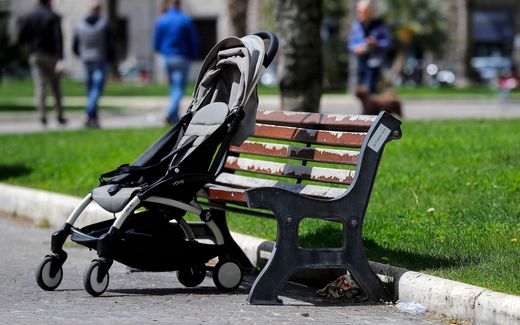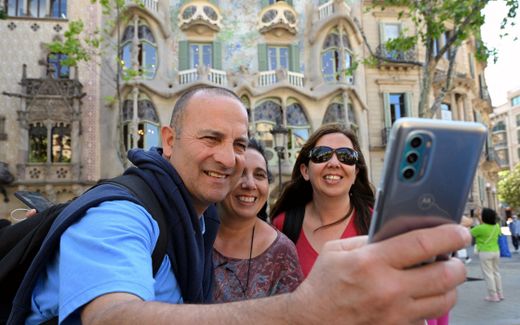Column from Spain: The newest generation in Spain is going back to its roots

Children playing with their mother in Barcelona, Spain. Photo AFP, Josep Lago
Christian Life
It is a widespread myth: becoming a civil servant is the highest career goal of generations of Spaniards. However, columnist Jorge Ruiz notices that younger people have surprisingly different goals.
Good salaries, but above all, security and stability, to “enjoy life” is said to be the quintessential life goal of Spaniards. That is the narrative. However, this perception is far from the truth.
Public employment, to which civil servants belong, only accounts for 16 per cent of the total jobs in Spain. Based on data from organisations such as the International Labour Organisation (ILO), the figures are below the EU average.
Moreover, according to surveys recently published, 34 per cent of pre-university young people aspire to start their own business or become self-employed, compared to 11 per cent who say they want to become civil servants.
These figures do not support the myth that becoming a civil servant is the “golden dream” of Spaniards. Instead, they suggest that young Spaniards prefer to do new things in life and be their own bosses, which corresponds quite well to our way of living.
Statistics
We can add more data insights to show a significant generational shift. On one hand, young men from the so-called “Generation Z” in Spain –presumably similar to those in other Western countries– are predominantly conservative in their views, while young women remain fairly progressive. I don’t have statistics to back this up, but it’s enough to chat with young people nowadays to notice it briefly.
This indeed represents a significant change compared to my generation. Back then, it was embarrassing to hold conservative opinions in public among the young; now, it’s quite the opposite.
Finally, although the press often claims that “Generation Z” doesn’t want to have children, this contrasts with the young people with prams on the streets. They don’t have many children and are often unmarried, but they have stable partners and don’t wait long to have children.
This, too, marks a change compared to the previous generation, for example, mine. People usually had long courtships, married late, and still waited years for children. It was not uncommon to see a significant age gap between the first and second child. Now, young people prefer to have two children soon after one another so that, they say, they can play together.
Labels
I must confess that I am somewhat confused by these generational labels—baby boomers, Generation X, Millennials, etc. When I was young, people of my age used to say that we were part of the “baby boom,” in our case, after the Civil War in Spain. However, by the mid-1990s, we learned that we actually belonged to Generation X, a label that came to us from America.
Indeed, there must have been some “generation gap” between the Spanish case and the rest of the Western world. The latter, since 1945, had been unanimously composed of liberal democracies, while Spain was a dictatorship with a traditionalist ideology until 1975.
Of course, someone born in Spain in 1951, for example, is not the same as someone like me, born in 1969, if only because by the time I was born, tourism was already fully developed, and with it, cultural change was inevitable and ongoing.
However, in Spain, the real turning point came in 1975, or more specifically, 1983, the year of the Socialist Party’s overwhelming electoral victory and everything that followed. I suppose all this would not be easy to categorise in a three-word phrase that is also valid for all Western countries.
Good lads
I could elaborate on the “generation of the good lads,” a strictly personal category I use to refer to teenagers in 1980. It is too deeply imbued with national, traditional, and Catholic education to adapt to the supersonic changes that would occur just a few years later.
Those born just three or four years later would have a completely different mentality and behaviour as teenagers. The “good lads” have adapted to the new times with difficulty. Even to this day.
If the “good lads” could barely adapt, our parents even less so. They raised us to work in our teens, save money, and marry as early as they did. If we didn’t work, we had to dedicate ourselves to our studies and go to university, which was made possible by their efforts as parents – as well as, it must be said, the scholarship system instituted by Franco’s regime in its final years. But many of us also indulged in partying, drinking, and drugs, and many were lost along the way.
For others, getting married was entirely eclipsed by pursuing an academic and professional career. And once married, the rates of marital failure have been truly catastrophic.
You may be wondering why I am saying all this and what it has to do with the initial point about “Generation Z.” I am simply venturing a strictly personal hypothesis: Despite appearances, “Generation Z” longs for family. Despite the press insisting that they don’t want children, they do have them. They have children first and then marry when they are reasonably sure the marriage will work. They don’t want to repeat marital failure.
The boys want to start a small company that can support the family. Above all, they won’t support feminist rhetoric and the like. They may know nothing about Christianity, but unlike my generation, they would never mock a serious Christian for their faith.
And I also see all this among Christians, especially those who embrace the Reformed faith and its emphasis on the family as the transmitter of faith.
“One generation passeth away, and another generation cometh; but the earth abideth forever”, says Ecclesiastes 1:4.
Related Articles









